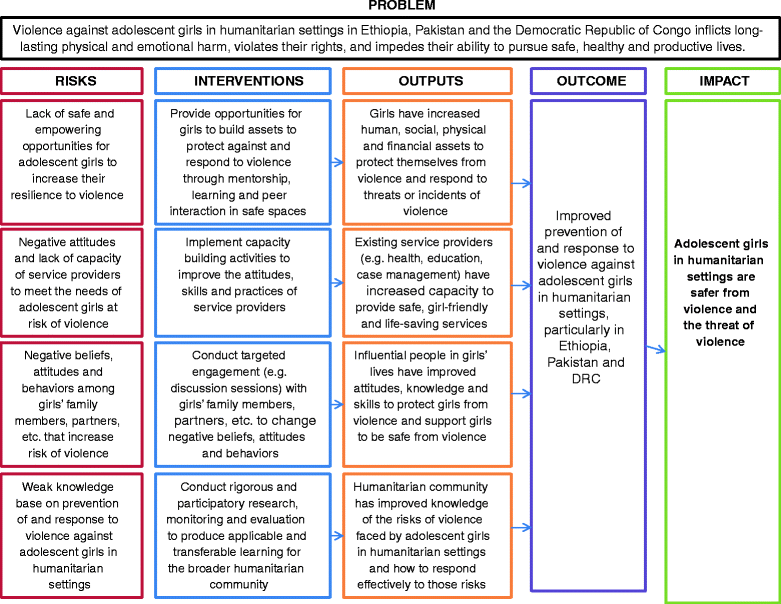Creating opportunities through mentorship, parental involvement, and safe spaces (COMPASS) program: multi-country study protocol to protect girls from violence in humanitarian settings
- PMID: 26945586
- PMCID: PMC4779562
- DOI: 10.1186/s12889-016-2894-3
Creating opportunities through mentorship, parental involvement, and safe spaces (COMPASS) program: multi-country study protocol to protect girls from violence in humanitarian settings
Abstract
Background: Violence against adolescent girls in humanitarian settings is of urgent concern given their additional vulnerabilities to violence and unique health and well-being needs that have largely been overlooked by the humanitarian community. In order to understand what works to prevent violence against adolescent girls, a multi-component curriculum-based safe spaces program (Creating Opportunities through Mentorship, Parental involvement and Safe Spaces - COMPASS) will be implemented and evaluated. The objectives of this multi-country study are to understand the feasibility, acceptability and effectiveness of COMPASS programming to prevent violence against adolescent girls in diverse humanitarian settings.
Methods/design: Two wait-listed cluster-randomized controlled trials are being implemented in conflict-affected communities in eastern Democratic Republic of Congo (N = 886 girls aged 10-14 years) and in refugee camps in western Ethiopia (N = 919 girls aged 13-19 years). The intervention consists of structured facilitated sessions delivered in safe spaces by young female mentors, caregiver discussion groups, capacity-building activities with service providers, and community engagement. In Ethiopia, the research centers on the overall impact of COMPASS compared to a wait-list group. In DRC, the research objective is to understand the incremental effectiveness of the caregiver component in addition to the other COMPASS activities as compared to a wait-list group. The primary outcome is change in sexual violence. Secondary outcomes include decreased physical and emotional abuse, reduced early marriage, improved gender norms, and positive interpersonal relationships, among others. Qualitative methodologies seek to understand girls' perceptions of safety within their communities, key challenges they face, and to identify potential pathways of change.
Discussion: These trials will add much needed evidence for the humanitarian community to meet the unique needs of adolescent girls and to promote their safety and well-being, as well as contributing to how multi-component empowerment programming for adolescent girls could be adapted across humanitarian settings.
Trial registration: Clinical Trials NCT02384642 (Registered: 2/24/15) & NCT02506543 (Registered: 7/19/15).
Similar articles
-
Caregiver parenting and gender attitudes: Associations with violence against adolescent girls in South Kivu, Democratic Republic of Congo.Child Abuse Negl. 2017 Jul;69:278-284. doi: 10.1016/j.chiabu.2017.04.032. Epub 2017 May 10. Child Abuse Negl. 2017. PMID: 28500924
-
How gender norms are reinforced through violence against adolescent girls in two conflict-affected populations.Child Abuse Negl. 2018 May;79:154-163. doi: 10.1016/j.chiabu.2018.02.002. Epub 2018 Feb 20. Child Abuse Negl. 2018. PMID: 29471217
-
Effects of a Social Empowerment Intervention on Economic Vulnerability for Adolescent Refugee Girls in Ethiopia.J Adolesc Health. 2018 Jan;62(1S):S15-S20. doi: 10.1016/j.jadohealth.2017.06.014. J Adolesc Health. 2018. PMID: 29273113
-
State of the Evidence: A Systematic Review of Approaches to Reduce Gender-Based Violence and Support the Empowerment of Adolescent Girls in Humanitarian Settings.Trauma Violence Abuse. 2019 Jul;20(3):428-434. doi: 10.1177/1524838017699601. Epub 2017 Mar 21. Trauma Violence Abuse. 2019. PMID: 29334024
-
The Effectiveness of Women and Girls Safe Spaces: A Systematic Review of Evidence to Address Violence Against Women and Girls in Humanitarian Contexts.Trauma Violence Abuse. 2022 Oct;23(4):1249-1261. doi: 10.1177/1524838021991306. Epub 2021 Feb 22. Trauma Violence Abuse. 2022. PMID: 33612087
Cited by
-
Qualitative Research Methods in Chronic Disease: Introduction and Opportunities to Promote Health Equity.Annu Rev Public Health. 2022 Apr 5;43:37-57. doi: 10.1146/annurev-publhealth-012420-105104. Epub 2021 Dec 22. Annu Rev Public Health. 2022. PMID: 34936827 Free PMC article. Review.
-
Disclosure bias for group versus individual reporting of violence amongst conflict-affected adolescent girls in DRC and Ethiopia.PLoS One. 2017 Apr 4;12(4):e0174741. doi: 10.1371/journal.pone.0174741. eCollection 2017. PLoS One. 2017. PMID: 28376108 Free PMC article.
-
The effect of gender norms on the association between violence and hope among girls in the Democratic Republic of the Congo.Glob Ment Health (Camb). 2017 Jan 9;4:e1. doi: 10.1017/gmh.2016.31. eCollection 2017. Glob Ment Health (Camb). 2017. PMID: 28596902 Free PMC article.
-
Building caregivers' emotional, parental and social support skills to prevent violence against adolescent girls: findings from a cluster randomised controlled trial in Democratic Republic of Congo.BMJ Glob Health. 2018 Oct 19;3(5):e000824. doi: 10.1136/bmjgh-2018-000824. eCollection 2018. BMJ Glob Health. 2018. PMID: 30398222 Free PMC article.
-
Preventing violence against refugee adolescent girls: findings from a cluster randomised controlled trial in Ethiopia.BMJ Glob Health. 2018 Oct 19;3(5):e000825. doi: 10.1136/bmjgh-2018-000825. eCollection 2018. BMJ Glob Health. 2018. PMID: 30398223 Free PMC article.
References
-
- UNHCR . World at war: global trends: forced displacement in 2014. Geneva, Switzerland: UNHCR; 2014.
-
- Schulte J, Rizvi Z. In search of safety and solutions: somali refugee adolescent girls at Sheder and Aw Barre Camps, Ethiopia. New York, NY: Women’s Refugee Commission; 2012.
-
- UNHCR . Driven by desperation: transactional sex as a survival strategy in Port au Prince IDP Camps. Geneva: United Nations High Commissioner for Refugees; 2011.
-
- van de Gaag N: In Double Jeopardy: Adolescent Girls and Disasters. In: Because I am a Girl: State of the World’s Girls 2013. Surrey, UK: Plan International; 2013.
-
- Vu A, Adam A, Wirtz A, Pham K, Rubenstein L, Glass N, Beyrer C, Singh S. The prevalence of sexual violence among female refugees in complex humanitarian emergencies: a systematic review and meta-analysis. PLos Currents Disasters 2014. doi:10.1371/currents.dis.835f10778fd80ae031aac12d3b533ca7. - PMC - PubMed
Publication types
MeSH terms
Associated data
LinkOut - more resources
Full Text Sources
Other Literature Sources
Medical


